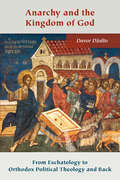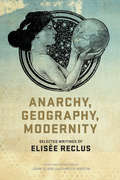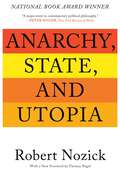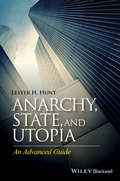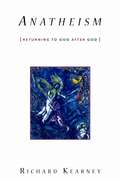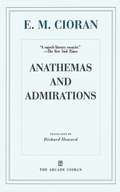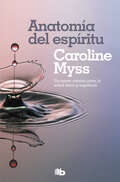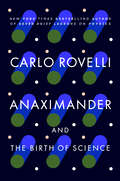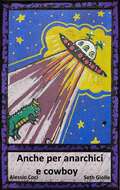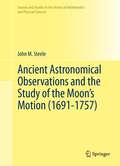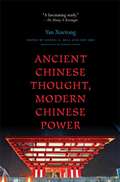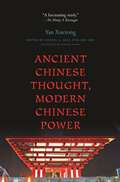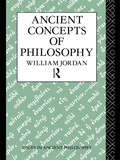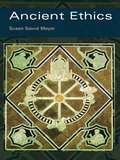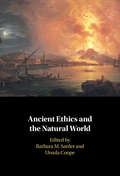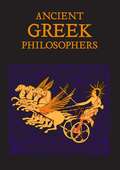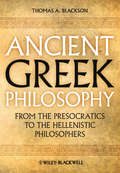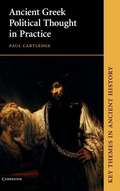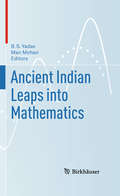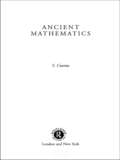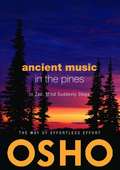- Table View
- List View
Anarchy and the Kingdom of God: From Eschatology to Orthodox Political Theology and Back (Orthodox Christianity and Contemporary Thought)
by Davor DžaltoAnarchy and the Kingdom of God reclaims the concept of “anarchism” both as a political philosophy and a way of thinking of the sociopolitical sphere from a theological perspective. Through a genuinely theological approach to the issues of power, coercion, and oppression, Davor Džalto advances human freedom—one of the most prominent forces in human history—as a foundational theological principle in Christianity. That principle enables a fresh reexamination of the problems of democracy and justice in the age of global (neoliberal) capitalism.
Anarchy, Geography, Modernity: Selected Writings of Elisée Reclus
by Elisée ReclusThe first comprehensive introduction to the thought of Elisée Reclus, the great anarchist geographer and political theorist, Anarchy, Geography, Modernity presents his groundbreaking critique of all forms of domination: not only capitalism, the state, and authoritarian religion, but also patriarchy, racism, technological domination, and the domination of nature. Not only an anarchist, but also a radical feminist, antiracist, ecologist, animal rights advocate, cultural radical, nudist, and vegetarian, Reclus' ideas are presented both through detailed exposition and analysis and in extensive translations of key texts, most appearing in English for the first time. The work elucidates Reclus' greatest achievement, a sweeping historical and theoretical synthesis recounting the story of the earth and humanity as an epochal struggle between freedom and domination, and his crucial insights on the interrelation between personal and small-group transformation, broader cultural change, and large-scale social organization are also explored.
Anarchy, State, and Utopia
by Robert NozickIn this brilliant and widely acclaimed book, winner of the 1975 National Book Award, Robert Nozick challenges the most commonly held political and social positions of our age?liberal, socialist, and conservative.
Anarchy, State, and Utopia: An Advanced Guide
by Lester H. HuntAnarchy, State, and Utopia: An Advanced Guide presents a comprehensive and accessible introduction to the ideas expressed in Robert Nozick’s highly influential 1974 work on free-market libertarianism—considered one of the most important and influential works of political philosophy published in the latter half of the 20th-century. Makes accessible all the major ideas and arguments presented in Nozick’s complex masterpiece Explains, as well as critiques, Robert Nozick’s theory of free market libertarianism Enables a new generation of readers to draw their own conclusions about the wealth of timely ideas on individualism and libertarian philosophy Indicates where Nozick’s theory has explanatory power, where it is implausible, and where there are loose ends with further work to be done
Anatheism: Returning to God After God (Insurrections: Critical Studies in Religion, Politics, and Culture)
by Richard KearneyHas the passing of the old God paved the way for a new kind of religious project, a more responsible way to seek, sound, and love the things we call divine? Has the suspension of dogmatic certainties and presumptions opened a space in which we can encounter religious wonder anew? Situated at the split between theism and atheism, we now have the opportunity to respond in deeper, freer ways to things we cannot fathom or prove. <P><P>Distinguished philosopher Richard Kearney calls this condition ana-theos, or God after God-a moment of creative "not knowing" that signifies a break with former sureties and invites us to forge new meanings from the most ancient of wisdoms. Anatheism refers to an inaugural event that lies at the heart of every great religion, a wager between hospitality and hostility to the stranger, the other-the sense of something "more." By analyzing the roots of our own anatheistic moment, Kearney shows not only how a return to God is possible for those who seek it but also how a more liberating faith can be born. Kearney begins by locating a turn toward sacred secularity in contemporary philosophy, focusing on Maurice Merleau-Ponty and Paul Ricoeur. He then marks "epiphanies" in the modernist masterpieces of James Joyce, Marcel Proust, and Virginia Woolf. Kearney concludes with a discussion of the role of theism and atheism in conflict and peace, confronting the distinction between sacramental and sacrificial belief or the God who gives life and the God who takes it away. Accepting that we can never be sure about God, he argues, is the only way to rediscover a hidden holiness in life and to reclaim an everyday divinity.
Anathemas and Admirations (Quartet Encounters Ser.)
by Richard Howard E. M. Cioran Eugene ThackerIn this collection of essays and epigrams, E.M. Cioran gives us portraits and evaluations--which he calls "admirations"--of Samuel Beckett, Jorge Luis Borges, F. Scott Fitzgerald, the poet Paul Valery, and Mircea Eliade, among others. In alternating sections of aphorisms--his "anathemas"--he delivers insights on such topics as solitude, flattery, vanity, friendship, insomnia, music, mortality, God, and the lure of disillusion.
Anatomía del espíritu: La curación del cuerpo llega a través del alma
by Caroline MyssCombinando diversas creencias para discutir la salud y la anatomía, la autora de Las siete moradas trata en este libro los sacramentos cristianos, los chakras hindús y el árbol de la vida del Kábala para determinar las siete regiones de energía que posee el cuerpo humano. Tarde o temprano, todos los seres enfermamos y el dolor reduce nuestra capacidad para el trabajo el placer, llegando incluso a arrebatarnos la vida. Sin embargo, pocas son las personas conscientes de que la enfermedad aparece cuando malgastamos nuestra energía, permitimos que nos la roben o la encarrilamos hace objetivos erróneos. Comprenderlo así nos abre el camino de la autocuración, un milagro posible si interpretamos las dolencias del cuerpo como lo que de verdad son: expresiones de un malestar espiritual que tiene curación.
Anatomía del espíritu: La curación del cuerpo llega a través del alma
by Caroline MyssEl long seller que nos enseña que la curación del cuerpo llega a través del alma. El aclamado programa de sanación a través de los siete pilares del poder energético. Este mítico libro resume más de dos décadas de investigación de Caroline Myss, una de las mayores voces de la espiritualidad mundial, en el campo de la medicina energética. En él muestra cómo cada enfermedad responde a un patrón de estrés emocional y psicológico vinculado a distintas áreas del cuerpo humano. Pero también ofrece un revolucionario programa que sintetiza la antigua sabiduría de tres religiones (los sacramentos cristianos, los chakras hindúes y el árbol de la vida de la Cábala) para demostrar los siete puntos energéticos de nuestro cuerpo, sus correspondencias y el modo en que nos afectan sus disfunciones. Al descubrirlo, se abre el camino de la autocuración, un milagro que muestra cómo interpretar las dolencias físicas y desarrollar los poderes latentes de la intuición para cultivar el crecimiento espiritual.. Reseña:«Una de las mejores voces de la espiritualidad.»Publishers Weekly
Anaximander: And the Birth of Science
by Carlo RovelliThe bestselling author of Seven Brief Lessons on Physics illuminates the nature of science through the revolutionary ideas of the Greek philosopher Anaximander Over two millennia ago, the prescient insights of Anaximander paved the way for cosmology, physics, geography, meteorology, and biology, setting in motion a new way of seeing the world. His legacy includes the revolutionary ideas that the Earth floats in a void, that animals evolved, that the world can be understood in natural rather than supernatural terms, and that universal laws govern all phenomena. He introduced a new mode of rational thinking with an openness to uncertainty and the progress of knowledge. In this elegant work, the renowned theoretical physicist Carlo Rovelli brings to light the importance of Anaximander&’s overlooked influence on modern science. He examines Anaximander not from the point of view of a historian or as an expert in Greek philosophy, but as a scientist interested in the deep nature of scientific thinking, which Rovelli locates in the critical and rebellious ability to reimagine the world again and again. Anaximander celebrates the radical lack of certainty that defines the scientific quest for knowledge.
Anche per anarchici e cowboy
by Seth GiolleUn Richiamo alla Tribù e alla Comunità per il Futuro dell’Umanità Anche per anarchici e cowboy Viviamo in un’epoca di incredibili progressi: la nostra società ha raggiunto traguardi impensabili. Dalla tecnologia avanzata alla scienza e all'astrofisica, siamo riusciti a mettere piede sulla Luna e a mandare sonde oltre i confini dello spazio conosciuto. Siamo a un passo da Marte e stiamo trasformando in realtà le fantasie più audaci della fantascienza, come il teletrasporto o la velocità di curvatura. Eppure, qui sulla Terra, mentre costruiamo automobili futuristiche, sviluppiamo medicine rivoluzionarie e coltiviamo piante che crescono anche nei deserti più aridi, sembra che abbiamo smarrito qualcosa di fondamentale: la nostra anima. Le conquiste tecnologiche spesso restano nelle mani di pochi, mentre vasti segmenti dell'umanità affrontano la fame, la sete e la disperazione. Se vogliamo davvero costruire un futuro condiviso e unirci come razza umana, dobbiamo tornare alle nostre radici, riscoprire i valori della tribù e della comunità. Nessuno può essere lasciato indietro. Questo libro ci guida attraverso l'immaginario di Maker Millwright, un costruttore di sogni visionario. Esploreremo il suo percorso, scoprendo come costruisce le basi del suo pensiero, innalza muri per proteggere e lancia il suo sguardo verso il cielo, perché chi non smette di sognare non conosce limiti. Per chiunque abbia il coraggio di accogliere il cambiamento, le possibilità sono infinite! E sì, qui c’è posto per tutti. Anche per gli anarchici e i cowboy.
Ancient Astronomical Observations and the Study of the Moon’s Motion (Sources and Studies in the History of Mathematics and Physical Sciences)
by John M. SteeleThe discovery of a gradual acceleration in the moon's mean motion by Edmond Halley in the last decade of the seventeenth century led to a revival of interest in reports of astronomical observations from antiquity. These observations provided the only means to study the moon's 'secular acceleration', as this newly-discovered acceleration became known. This book contains the first detailed study of the use of ancient and medieval astronomical observations in order to investigate the moon's secular acceleration from its discovery by Halley to the establishment of the magnitude of the acceleration by Richard Dunthorne, Tobias Mayer and Jérôme Lalande in the 1740s and 1750s. Making extensive use of previously unstudied manuscripts, this work shows how different astronomers used the same small body of preserved ancient observations in different ways in their work on the secular acceleration. In addition, this work looks at the wider context of the study of the moon's secular acceleration, including its use in debates of biblical chronology, whether the heavens were made up of æther, and the use of astronomy in determining geographical longitude. It also discusses wider issues of the perceptions and knowledge of ancient and medieval astronomy in the early-modern period. This book will be of interest to historians of astronomy, astronomers and historians of the ancient world.
Ancient Chinese Thought, Modern Chinese Power
by Yan XuetongThe rise of China could be the most important political development of the twenty-first century. What will China look like in the future? What should it look like? And what will China's rise mean for the rest of world? This book, written by China's most influential foreign policy thinker, sets out a vision for the coming decades from China's point of view. In the West, Yan Xuetong is often regarded as a hawkish policy advisor and enemy of liberal internationalists. But a very different picture emerges from this book, as Yan examines the lessons of ancient Chinese political thought for the future of China and the development of a "Beijing consensus" in international relations. Yan, it becomes clear, is neither a communist who believes that economic might is the key to national power, nor a neoconservative who believes that China should rely on military might to get its way. Rather, Yan argues, political leadership is the key to national power, and morality is an essential part of political leadership. Economic and military might are important components of national power, but they are secondary to political leaders who act in accordance with moral norms, and the same holds true in determining the hierarchy of the global order. Providing new insights into the thinking of one of China's leading foreign policy figures, this book will be essential reading for anyone interested in China's rise or in international relations.
Ancient Chinese Thought, Modern Chinese Power (The Princeton-China Series #5)
by Xuetong YanFrom China's most influential foreign policy thinker, a vision for a "Beijing Consensus" for international relationsThe rise of China could be the most important political development of the twenty-first century. What will China look like in the future? What should it look like? And what will China's rise mean for the rest of world? This book, written by China's most influential foreign policy thinker, sets out a vision for the coming decades from China's point of view.In the West, Yan Xuetong is often regarded as a hawkish policy advisor and enemy of liberal internationalists. But a very different picture emerges from this book, as Yan examines the lessons of ancient Chinese political thought for the future of China and the development of a "Beijing consensus" in international relations. Yan, it becomes clear, is neither a communist who believes that economic might is the key to national power, nor a neoconservative who believes that China should rely on military might to get its way. Rather, Yan argues, political leadership is the key to national power, and morality is an essential part of political leadership. Economic and military might are important components of national power, but they are secondary to political leaders who act in accordance with moral norms, and the same holds true in determining the hierarchy of the global order.Providing new insights into the thinking of one of China's leading foreign policy figures, this book will be essential reading for anyone interested in China's rise or in international relations.
Ancient Concepts of Philosophy (Issues in Ancient Philosophy)
by William JordanFirst published in 1993. Routledge is an imprint of Taylor & Francis, an informa company.
Ancient Ethics
by Susan Sauvé MeyerThis is the first comprehensive guide and only substantial undergraduate level introduction to ancient Greek and Roman ethics.It covers the ethical theories and positions of all the major philosophers (including Socrates, Plato and Aristotle) and schools (Stoics and Epicureans) from the earliest times to the Hellenistic philosophers, analyzing their main arguments and assessing their legacy. This book maps the foundations of this key area, which is crucial knowledge across the disciplines and essential for a wide range of readers.
Ancient Ethics and the Natural World
by Barbara M. Sattler Ursula CoopeThis book explores a distinctive feature of ancient philosophy: the close relation between ancient ethics and the study of the natural world. Human beings are in some sense part of the natural world, and they live their lives within a larger cosmos, but their actions are governed by norms whose relation to the natural world is up for debate. The essays in this volume, written by leading specialists in ancient philosophy, discuss how these facts about our relation to the world bear both upon ancient accounts of human goodness and also upon ancient accounts of the natural world itself. The volume includes discussion not only of Plato and Aristotle, but also of earlier and later thinkers, with an essay on the Presocratics and two essays that discuss later Epicurean, Stoic, and Neoplatonist philosophers.
Ancient Forgiveness
by Charles L. Griswold David KonstanIn this book, eminent scholars of classical antiquity and ancient and medieval Judaism and Christianity explore the nature and place of forgiveness in the pre-modern Western world. They discuss whether the concept of forgiveness, as it is often understood today, was absent, or at all events more restricted in scope than has been commonly supposed, and what related ideas (such as clemency or reconciliation) may have taken the place of forgiveness. An introductory chapter reviews the conceptual territory of forgiveness and illuminates the potential breadth of the idea, enumerating the important questions a theory of the subject should explore. The following chapters examine forgiveness in the contexts of classical Greece and Rome; the Hebrew Bible, the Talmud, and Moses Maimonides; and the New Testament, the Church Fathers, and Thomas Aquinas.
Ancient Greece
by Robert PayneA history of Greece from its founding to the advent of Philip of Macedon. Covers all aspects of Greek life, philosophy and literature.
Ancient Greek Philosophers (Leather-bound Classics)
by Kenneth C. Mondschein Editors of Canterbury Classics"Philosophy begins in wonder." --PlatoHave you ever wondered about the development of civilization? What topics were discussed in the days of Ancient Greece? This collection of thoughts from Plato, Aristotle, and other masters of philosophy will lead your mind on a journey of enlightened exploration into ethics, morality, law, medicine, and more. With an introduction by a distinguished scholar of classic literature, this Canterbury Classics volume is sure to be a favorite keepsake edition.
Ancient Greek Philosophy: From the Presocratics to the Hellenistic Philosophers
by Thomas A. BlacksonAncient Greek Philosophy: From the Presocratics to the Hellenistic Philosophers presents a comprehensive introduction to the philosophers and philosophical traditions that developed in ancient Greece from 585 BC to 529 AD. Provides coverage of the Presocratics through the Hellenistic philosophers Moves beyond traditional textbooks that conclude with Aristotle A uniquely balanced organization of exposition, choice excerpts and commentary, informed by classroom feedback Contextual commentary traces the development of lines of thought through the period, ideal for students new to the discipline Can be used in conjunction with the online resources found at http://tomblackson.com/Ancient/toc.html
Ancient Greek Political Thought in Practice
by Paul CartledgeAncient Greece was a place of tremendous political experiment and innovation, and it was here too that the first serious political thinkers emerged. Using carefully selected case-studies, Professor Cartledge investigates the dynamic interaction between ancient Greek political thought and practice from early historic times to the early Roman Empire. Of concern throughout are three major issues: first, the relationship of political thought and practice; second, the relevance of class and status to explaining political behaviour and thinking; third, democracy - its invention, development and expansion, and extinction, prior to its recent resuscitation and even apotheosis. In addition, monarchy in various forms and at different periods and the peculiar political structures of Sparta are treated in detail over a chronological range extending from Homer to Plutarch. The book provides an introduction to the topic for all students and non-specialists who appreciate the continued relevance of ancient Greece to political theory and practice today.
Ancient Indian Leaps into Mathematics
by B. S. Yadav Man MohanThis book presents contributions of mathematicians covering topics from ancient India, placing them in the broader context of the history of mathematics. Although the translations of some Sanskrit mathematical texts are available in the literature, Indian contributions are rarely presented in major Western historical works. Yet some of the well-known and universally-accepted discoveries from India, including the concept of zero and the decimal representation of numbers, have made lasting contributions to the foundation of modern mathematics. Through a systematic approach, this book examines these ancient mathematical ideas that were spread throughout India, China, the Islamic world, and Western Europe.
Ancient Mathematics (Sciences of Antiquity)
by Serafina CuomoThe theorem of Pythagoras, Euclid's "Elements", Archimedes' method to find the volume of a sphere: all parts of the invaluable legacy of ancient mathematics. But ancient mathematics was also about counting and measuring, surveying land and attributing mystical significance to the number six. This volume offers the first accessible survey of the discipline in all its variety and diversity of practices. The period covered ranges from the fifth century BC to the sixth century AD, with the focus on the Mediterranean region. Topics include:* mathematics and politics in classical Greece* the formation of mathematical traditions* the self-image of mathematicians in the Graeco-Roman period* mathematics and Christianity* and the use of the mathematical past in late antiquity.
Ancient Models of Mind
by Andrea Nightingale David SedleyHow does god think? How, ideally, does a human mind function? Must a gap remain between these two paradigms of rationality? Such questions exercised the greatest ancient philosophers, including those featured in this book: Socrates, Plato, Aristotle, the Stoics and Plotinus. This volume encompasses a series of studies by leading scholars, revisiting key moments of ancient philosophy and highlighting the theme of human and divine rationality in both moral and cognitive psychology. The volume is a tribute to A. A. Long, and reflects multiple themes of his own work.
Ancient Music in the Pines
by Osho Osho International FoundationToday, humanity is caught up in the mad complexity of the mind, and as never before, there is an urgent need to rediscover simplicity and innocence. Osho brings to life the inherent and timeless wisdom of traditional Zen stories. He shows us that Zen is a way of dissolving philosophical problems, not of solving them. It is a way of getting rid of philosophy, because philosophy is a sort of neurosis. Zen is for those intelligent enough to understand the limitations of the intellect and ready to recognize the significance of intuition in the world of mysticism.
